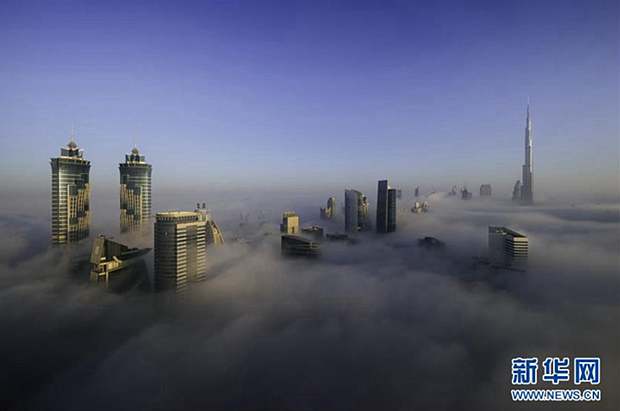UAE gears up to greet President Xi
- By Sabena Siddiqui
 0 Comment(s)
0 Comment(s) Print
Print E-mail China.org.cn, July 18, 2018
E-mail China.org.cn, July 18, 2018

Dubai, United Arab Emirates [Photo/Xinhua]
With the seventh largest oil and gas reserves in the world, the United Arab Emirates is strategically located in the vicinity of Asia and Africa's major oil consuming nations. As one of the fastest growing economies in the world, China requires energy security to maintain a higher than 6 percent annual GDP growth rate.
China's domestic consumption equals nearly one fourth of global primary energy, and has invested in energy supplies from the Middle East as the preferred option. In turn, linking up with China has opened new doors for the Gulf Cooperation Council (GCC) countries who are seeing the Belt and Road Initiative as a bridge to market its commodities.
Touring the UAE on a state visit soon, President Xi Jinping is being awaited with great excitement by his hosts and it is being billed as the beginning of a new era. Coinciding with President Xi's visit, the 27 years of China-UAE relations are to be celebrated all across the UAE from July 19-21. Chinese culture is to be in the spotlight across all the Emirates and Chinese movies will be shown in cinemas. Considering all this geniality, it is a good time to sum up the progress of China-UAE ties through the decades.
Establishing diplomatic relations in 1984, the UAE Embassy in Beijing opened in 1987. The UAE is now China's second largest global trading partner in Middle East and North Africa with an annual trade volume of over $50 billion.
Bilateral ties developed further as it joined the BRI and the China-led Asian Infrastructure Investment Bank. Significantly, even though none of the six corridors of the BRI run through the Emirates, increased connectivity is an opportunity for UAE to showcase its infrastructure capabilities and the financial liquidity it offers as home to many of the largest sovereign wealth funds. Playing a prominent role in the internationalization of the renminbi, the UAE is also a key BRI stop-over destination for business.
The China-UAE ties have also been thriving on the diplomatic front as well. Only last year, bitter feuds broke out between Saudi Arabia, UAE and Qatar. Calling for a diplomatic solution, China had refused to take sides with any of the nations and stressed the need for stability in the Gulf region. Facing political frictions has made trade difficult and complicated matters for the region but the situation has greatly improved now.
Citizens of both nations also get along well and as many as 200,000 Chinese people are Dubai residents even though the UAE has a population of only 9.3 million. Notably, 4,200 Chinese companies are based in the UAE, 356 Chinese trade agencies have offices there and as many as 2, 500 Chinese trade labels are registered.
Under the GCC umbrella, the UAE is also part of policy coordination mechanisms such as the China-Arab Cooperation Forum and the Strategic Dialogue between China and the GCC states. Recently Beijing has endorsed that "any type of bilateral cooperation (with China) can be considered part of the Belt and Road."
Adopting a "1+2+3" cooperation pattern under the Arab Policy Paper published in 2016, energy cooperation, construction, trade and investment facilitation and collaborating on innovative technologies in the fields of nuclear energy, space satellites have been planned.
Currently, due to falling oil prices, the region is looking for new financial avenues and China presents a slew of possibilities such as the opening of an international exchange to cater for the BRI. In fact, a $10 billion strategic co-investment fund was launched to cover diversified commercial investments in varied growth sectors in 2015, in accordance with President Xi's vision that it would play a critical role in supporting the Belt and Road Initiative.
Another dimension apart from the BRI components is the Digital Silk Road discussed at the BRI Forum in 2017. Visualizing an innovative action plan for smart cities, digital economy, e-commerce as well as science and technology parks, this idea also goes well with the smart city plans already announced by the UAE.
As a gateway to new consumer markets and lucrative investment options, the UAE has great potential and it could even be a future member of the Shanghai Cooperation Organization further down the road.
Writing about China-UAE bilateral relations, UAE Minister of State Sultan Al Jaber says, "Given our unique geographical location, at the gateway between East and West, the UAE can help play a pivotal role in helping realize that vision. The advanced logistical capabilities of our ports, in particular in Dubai and Abu Dhabi, have established the UAE as a critical trading hub that connects Europe, Asia and Africa."
Providing UAE states a new global marketplace, China offers them economic diversity and new sources of revenue as well as opportunities for multilateral partnerships around the world.
Sabena Siddiqui (Twitter: @sabena_siddiqi) is a foreign affairs journalist and lawyer based in Pakistan.
Opinion articles reflect the views of their authors, not necessarily those of China.org.cn.






Go to Forum >>0 Comment(s)